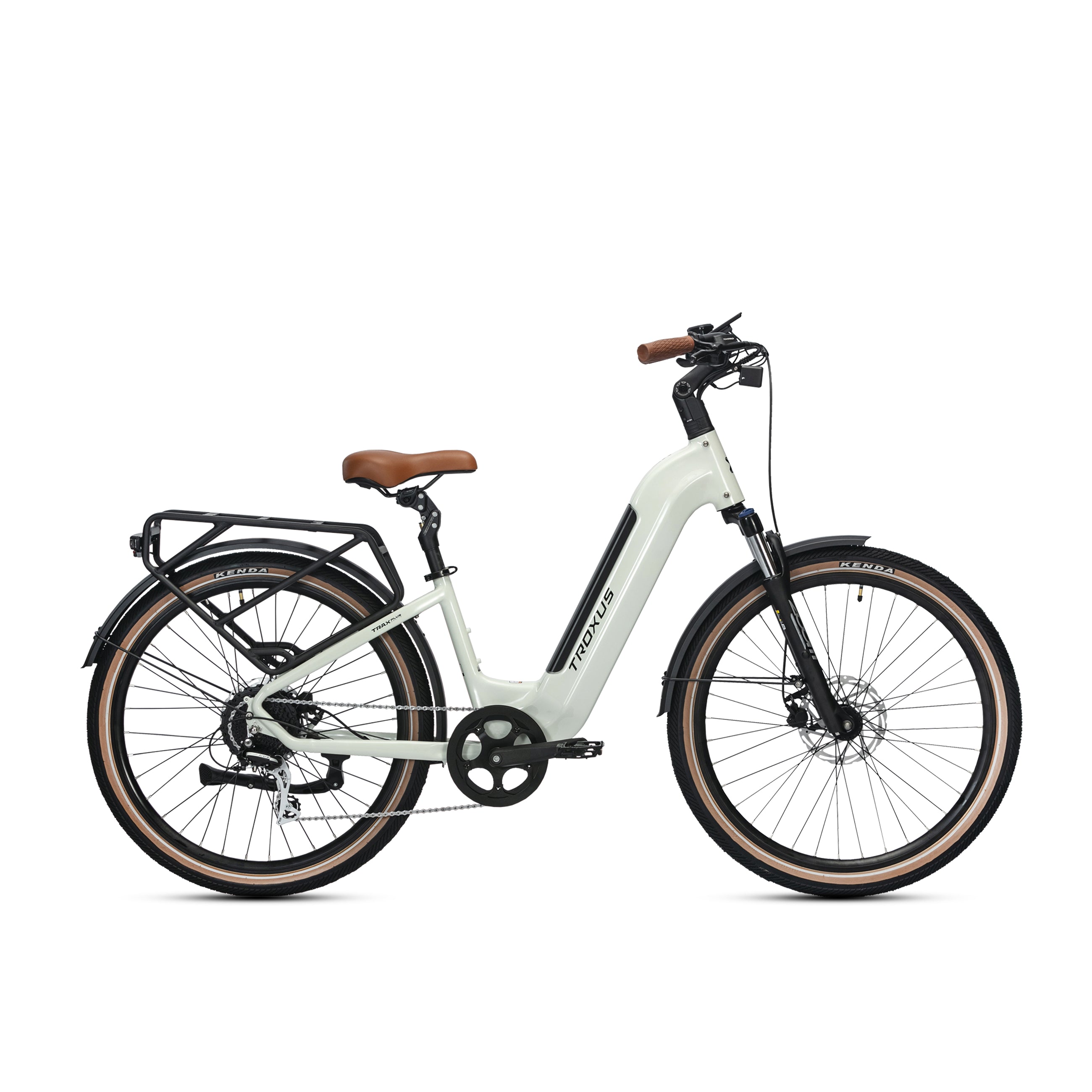With the humming of motors and the gentle whiz of wheels, a silent revolution is taking over our streets and pathways. Electric bicycles, often referred to as e-bikes, are no longer just a niche marker for the green-hearted or cycling purists. They have morphed into a common transportation choice for urban dwellers, outdoor enthusiasts, and eco-conscious commuters. The surge in e-bike popularity is not just a trend but a seismic cultural shift towards sustainability and health-conscious living. This in-depth exploration will peel back the layers behind this sudden surge. We aim to unpack the environmental, economic, and health benefits of e-bikes, as well as tackle the challenges of e-bike adoption and discuss the future landscape of e-bike infrastructure and technology.
Content
Understanding the Appeal of Electric Bikes
Environmental Benefits of Electric Bikes
Overcoming Barriers to Adoption
Infrastructure and Policy Support
Understanding the Appeal of Electric Bikes
The adoption of electric bikes is experiencing a remarkable surge on a global scale. These innovative modes of transportation are capturing the interest of a diverse range of individuals, from the seasoned mountain biker seeking new adventures to the daily urban commuter looking for a convenient and eco-friendly way to navigate city streets. The versatility of electric bikes is truly remarkable, offering a seamless transition between various terrains and catering to a wide spectrum of riders. What fuels this growing affection for e-bikes? The convenience, sustainability, and sheer joy of riding these modern marvels are just a few factors contributing to their increasing popularity worldwide.
The Versatility Factor
Picture a world where a single bike can seamlessly transition between being your reliable commuter to your versatile errand-runner, and your trusted companion on weekend getaways. Electric bikes have revolutionized the way we navigate between the daily grind and the serenity of the great outdoors. With a myriad of models tailored to diverse terrains and lifestyles, they embody the essence of a Swiss Army knife, offering a multifaceted solution to modern mobility needs. Whether conquering city streets or exploring off-road trails, electric bikes cater to a spectrum of preferences, from urban commuters seeking efficiency to adventure enthusiasts craving exploration. Their electric assistance not only enhances the biking experience but also promotes sustainability by reducing reliance on traditional modes of transportation. As we embrace this innovative era of cycling, electric bikes stand out as versatile companions that blur the boundaries between practicality and adventure, redefining the concept of two-wheeled travel in the contemporary world.
The Health and Lifestyle Upgrade
For many people, integrating electric bikes into their daily routines has provided a significant increase in physical activity without the associated strain on the body. It offers a way to exercise without the need for excessive energy expenditure, serving as a beneficial option for individuals who may have been hesitant due to the physical exertion typically required by traditional biking activities.
Electric bikes have revolutionized the way people approach commuting and leisure cycling by offering assistance when needed, making it easier for riders to navigate challenging terrains or longer distances. This innovation has not only made cycling more accessible to a wider range of individuals but has also encouraged more people to embrace a more active lifestyle.
By blending the convenience of motorized assistance with the health benefits of cycling, electric bikes have become a popular choice for those looking to incorporate more physical activity into their daily lives. The ability to control the level of assistance allows riders to tailor their workouts to their fitness levels, promoting a gradual increase in activity without the risk of overexertion. Overall, the introduction of electric bikes has opened up new possibilities for individuals to enjoy the outdoors, improve their fitness, and lead a more active and fulfilling life.
Environmental Benefits of Electric Bikes
A Reduction in Carbon Footprint
Electric bikes offer a sustainable transportation option that plays a crucial role in reducing individuals' carbon footprint. By opting for electric bikes, riders actively contribute to a healthier environment by minimizing greenhouse gas emissions and promoting eco-friendly practices. These innovative electric bicycles serve as a gateway to greener urban environments, fostering a shift towards cleaner modes of commuting in bustling cities. With their energy-efficient design and eco-conscious operation, electric bikes are paving the way for a more sustainable future, where individuals can move around urban areas with minimal environmental impact. By embracing e-bikes as a means of transportation, individuals not only reduce their carbon emissions but also promote a cleaner, healthier lifestyle for themselves and future generations. The growing popularity of e-bikes signifies a positive shift towards more sustainable transportation choices, encouraging communities to prioritize environmental conservation and embrace eco-friendly alternatives for a greener tomorrow.
An Answer to Urban Air Quality
Cities worldwide are actively addressing the issue of air pollution. Electric bikes have emerged as a promising solution in this fight. By producing zero tailpipe emissions and having the ability to alleviate traffic congestion, electric bikes are playing a significant role as catalysts for positive change. Their integration into urban transportation systems marks a shift towards cleaner and more sustainable modes of travel. As cities strive to create healthier environments for their residents, the adoption of electric bikes presents a practical and eco-friendly option. Furthermore, the growing popularity of electric bikes is reshaping the urban mobility landscape, offering individuals a greener and more efficient way to navigate bustling city streets. With an increasing emphasis on reducing carbon footprints and promoting environmental consciousness, e-bikes stand out as a viable and impactful solution in the ongoing battle against air pollution. As we look towards a future of cleaner air and improved urban living conditions, the role of electric bikes in promoting sustainability and combating pollution is more crucial than ever.
Continue reading: Eco-Friendly Commuting: How Electric Bikes Are Revolutionizing Urban Transportation
Economic and Health Benefits
Financial Incentive
Commuting with electric bikes offers significant cost savings compared to traditional vehicles. The financial benefits are evident in various aspects, including reduced fuel expenses, minimized maintenance costs, and overall affordability. E-bikes not only provide a more economical transportation option but also contribute to environmental sustainability by reducing carbon emissions and promoting eco-friendly travel practices. By choosing electric bikes for daily commuting, individuals can enjoy long-term savings and financial efficiency while supporting a greener way of transportation. Additionally, the versatility of e-bikes allows for convenient and flexible commuting experiences, making them a practical choice for individuals seeking cost-effective and sustainable transportation solutions. In summary, the cost-effectiveness of e-bikes extends beyond monetary savings, encompassing environmental benefits and enhanced mobility for a more sustainable and efficient commuting experience.
Continue reading: How Much Can You Save By Switching To Electric Bikes?
A Boost to Personal Well-being
Electric bikes are a fantastic way to promote physical activity and enhance cardiovascular health. The combination of pedaling and electric assistance provides a low-impact workout that can benefit individuals of various fitness levels. Not only does riding an electric bike contribute to physical well-being, but it also offers mental health advantages. Many riders experience reduced stress levels and improved cognitive function as they enjoy the freedom of cruising on two wheels. The convenience and accessibility of e-bikes make them a popular choice for commuting, leisurely rides, or exploring new terrains. By incorporating e-bikes into daily routines, individuals can reap the rewards of improved health and well-being. Whether it's a scenic ride through the park or a quick trip to the store, e-bikes offer a fun and eco-friendly way to stay active and feel good. So, hop on an e-bike and start your journey to a healthier lifestyle today!

Overcoming Barriers to Adoption
When considering the adoption of any new technology or lifestyle change, it's important to acknowledge that challenges may arise. Electric bikes, while offering numerous benefits, also present hurdles that need to be overcome. Addressing common misconceptions and technical concerns surrounding e-bikes can help demystify the process for those considering this innovative mode of transportation.
Range Anxiety No More
By gaining a deeper insight into the functionalities of contemporary e-bikes alongside their battery systems, cyclists can embark on extensive journeys with assurance. Modern electric bikes have revolutionized the riding experience, offering enhanced speed, efficiency, and convenience. With advanced battery technologies, riders can explore vast distances without worrying about running out of power. The evolution of e-bikes has opened up new possibilities for eco-friendly transportation, promoting sustainability and reducing carbon footprints. By harnessing the potential of electric-assist bicycles, riders can enjoy longer rides, tackle challenging terrains, and commute with ease. The convenience of electric bikes extends beyond recreational use, making them a practical choice for daily commuting and errands. As the popularity of electric bikes continues to rise, understanding the nuances of battery management and e-bike capabilities becomes crucial for riders seeking to maximize their cycling experience. By optimizing the use of e-bike features and battery efficiency, cyclists can embark on unforgettable journeys with confidence, knowing that their electric bike can support their adventures every step of the way.
Safety First
Addressing safety concerns head-on, specifically focusing on aspects like speed management and sharing the road, plays a crucial role in ensuring that electric bike riders are not only well-informed but also adequately prepared to navigate their journeys with reduced risks. By emphasizing the importance of safety measures, riders can proactively engage in practices that promote their well-being and that of others sharing the road. It is imperative for e-bike riders to adhere to traffic rules, wear appropriate safety gear, and maintain a responsible speed limit to prevent accidents and ensure a safe riding experience. Moreover, promoting awareness about the significance of road safety and conducting regular safety checks on e-bikes can further enhance the overall safety standards within the e-biking community. Through a collective effort to prioritize safety and advocate for responsible riding practices, electric bike enthusiasts can contribute to creating a safer environment for all road users, fostering a culture of shared responsibility and mutual respect on the streets.
Continue reading: Pre-ride Safety Checks For More Fun In The Sun
Infrastructure and Policy Support
For e-bikes to transition into a widely accepted and utilized transportation solution, it is imperative to have robust support from infrastructure development and the implementation of favorable policies that cater to the needs of electric bike users. This backing will not only enhance the accessibility and convenience of electric bikes but also promote their integration into the urban mobility landscape, fostering a sustainable and eco-friendly transportation ecosystem.
Building the Right Path
Investing in wider bike lanes, more secure parking, and developing charging station networks play a vital role in establishing an e-bike-friendly environment. Wider bike lanes provide safer pathways for electric bike riders, encouraging more people to adopt this sustainable mode of transportation. The presence of secure parking facilities ensures that electric bike users have convenient places to store their bikes, enhancing accessibility and encouraging e-bike usage. Furthermore, the development of charging station networks is crucial to address the range anxiety associated with e-bikes. By strategically placing charging stations in key locations, riders can confidently plan their routes knowing that they have access to charging facilities when needed. This infrastructure investment not only supports the growing electric bike community but also promotes eco-friendly transportation options that contribute to reducing carbon emissions and alleviating traffic congestion. Overall, prioritizing these initiatives is essential in fostering a more e-bike-friendly environment that promotes sustainability and enhances the overall urban mobility landscape.
Policy Push
Governments play a pivotal role in promoting the adoption of electric bikes, which offer a sustainable and efficient mode of transportation. One effective strategy is to provide subsidies to incentivize the purchase of electric bikes, making them more affordable for a wider range of individuals. Tax incentives can further encourage the transition to electric bikes by reducing the financial burden on consumers. Additionally, revising traffic laws to accommodate e-bikes is crucial for ensuring the safety of riders. This can include creating designated lanes or paths specifically for e-bikes, as well as implementing regulations that prioritize the safety of e-bike users on the road.
By implementing these measures, governments can not only promote the use of e-bikes as a greener alternative to traditional vehicles but also contribute to reducing traffic congestion and improving air quality in urban areas. Encouraging the adoption of electric bikes aligns with sustainability goals and helps create a more environmentally friendly transportation system for the future. It is essential for policymakers to consider these initiatives as part of a holistic approach to fostering sustainable mobility solutions and addressing the challenges of urban transportation in a rapidly evolving world.

The Future of Electric Bikes
E-bikes are not just a passing fad; they represent the future of a more connected, healthier, and sustainable society. These electric bicycles offer a convenient and eco-friendly mode of transportation that promotes active living while reducing carbon emissions. With their rising popularity, e-bikes are reshaping urban mobility and contributing to a greener future for all.
Innovation and Technology
What does the future hold for electric bike technology? Well, the possibilities are quite exciting. Advanced battery solutions are expected to revolutionize the way electric bikes operate, offering longer ranges and faster charging times. Additionally, smart features like GPS tracking will enhance the overall riding experience, providing riders with real-time navigation and route optimization. Moreover, the integration of artificial intelligence (AI) into electric bikes is a promising development that could personalize the riding experience based on individual preferences and behavior patterns. Imagine an electric bike that adjusts its assistance levels automatically to suit your riding style or terrain conditions. In conclusion, the future of electric bike technology is bright, with innovations that aim to make riding more convenient, efficient, and enjoyable. As these advancements continue to evolve, they are poised to become an even more integral part of sustainable transportation solutions, offering a greener and smarter way to commute and explore the world around us.
Mainstream Acceptance
As more individuals recognize the practicality and advantages of electric bikes, they are increasingly becoming a staple in our transportation options. E-bikes offer a convenient and eco-friendly way to commute, reducing reliance on traditional vehicles and promoting sustainable living. With the rising concerns over environmental impact and the need for efficient urban transportation, e-bikes present a compelling solution that aligns with the growing trend towards green mobility.
Furthermore, the technological advancements in electric bikes have made them more accessible and user-friendly for people of all ages and fitness levels. The electric assistance provided by electric bikes enables riders to travel longer distances with less effort, making them a viable alternative to conventional bicycles or cars. This versatility makes e-bikes suitable for various purposes, whether it's daily commuting, recreational rides, or even fitness activities.
As the infrastructure for cycling improves in many cities and more bike-friendly initiatives are implemented, electric bikes are poised to play a significant role in shaping the future of urban mobility. Their integration into existing transportation systems can help reduce traffic congestion, lower carbon emissions, and promote healthier lifestyles. Embracing e-bikes not only contributes to a greener environment but also enhances personal well-being by encouraging physical activity and outdoor engagement.
In Conclusion
The electric bike is more than just a novel form of transportation; it's an engine for change. It symbolizes a shift towards a world where practicality meets sustainability without sacrificing style or comfort. Now is the time to join this electrifying movement and pedal into a future that holds reduced carbon footprints, healthier lives, and endless adventures.
For those considering making the 'e'-volution, it's a decision with a broad horizon of benefits. And for the purists out there, it's not about discarding the past but about enhancing it with the technologies of today that propel us towards a brighter, healthier tomorrow. Welcome to the e-revolution… it's time to roll.








